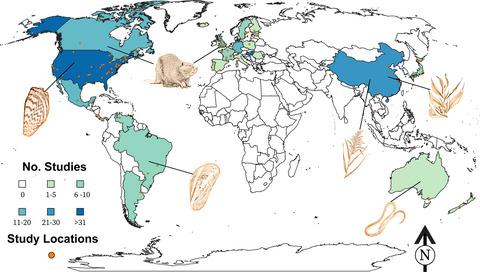当前位置:
X-MOL 学术
›
Ecol. Lett.
›
论文详情
Our official English website, www.x-mol.net, welcomes your
feedback! (Note: you will need to create a separate account there.)
Uncovering patterns of freshwater positive interactions using meta‐analysis: Identifying the roles of common participants, invasive species and environmental context
Ecology Letters ( IF 7.6 ) Pub Date : 2020-12-28 , DOI: 10.1111/ele.13664 Lindsey K. Albertson 1 , Michael J. MacDonald 1 , Benjamin B. Tumolo 1 , Michelle A. Briggs 1 , Zachary Maguire 1 , Sierra Quinn 1 , Jose A. Sanchez‐Ruiz 1 , Jaris Veneros 1 , Laura A. Burkle 1
Ecology Letters ( IF 7.6 ) Pub Date : 2020-12-28 , DOI: 10.1111/ele.13664 Lindsey K. Albertson 1 , Michael J. MacDonald 1 , Benjamin B. Tumolo 1 , Michelle A. Briggs 1 , Zachary Maguire 1 , Sierra Quinn 1 , Jose A. Sanchez‐Ruiz 1 , Jaris Veneros 1 , Laura A. Burkle 1
Affiliation

|
Positive interactions are sensitive to human activities, necessitating synthetic approaches to elucidate broad patterns and predict future changes if these interactions are altered or lost. General understanding of freshwater positive interactions has been far outpaced by knowledge of these important relationships in terrestrial and marine ecosystems. We conducted a global meta‐analysis to evaluate the magnitude of positive interactions across freshwater habitats. In 340 studies, we found substantial positive effects, with facilitators increasing beneficiaries by, on average, 81% across all taxa and response variables. Mollusks in particular were commonly studied as both facilitators and beneficiaries. Amphibians were one group benefiting the most from positive interactions, yet few studies investigated amphibians. Invasive facilitators had stronger positive effects on beneficiaries than non‐invasive facilitators. We compared positive effects between high‐ and low‐stress conditions and found no difference in the magnitude of benefit in the subset of studies that manipulated stressors. Future areas of research include understudied facilitators and beneficiaries, the stress gradient hypothesis, patterns across space or time and the influence of declining taxa whose elimination would jeopardise fragile positive interaction networks. Freshwater positive interactions occur among a wide range of taxa, influence populations, communities and ecosystem processes and deserve further exploration.
中文翻译:

使用荟萃分析发现淡水正面相互作用的模式:确定共同参与者,入侵物种和环境背景的作用
积极互动对人类活动敏感,因此有必要采用综合方法阐明广泛的模式并预测如果这些互动发生改变或丢失的未来变化。对陆地和海洋生态系统中这些重要关系的了解远远超出了对淡水积极相互作用的一般理解。我们进行了一项全球荟萃分析,以评估跨淡水生境的积极相互作用的程度。在340项研究中,我们发现了巨大的积极影响,在所有分类单元和响应变量中,促进者平均使受益人增加了81%。特别是软体动物通常被当作促进者和受益者来研究。两栖动物是从正面互动中受益最大的群体,但很少有研究调查两栖动物。侵入性促进者比非侵入性促进者对受益人具有更强的积极作用。我们比较了高压力和低压力条件下的积极效果,发现在操纵压力源的研究子集中,收益的大小没有差异。未来的研究领域包括研究不足的促进者和受益者,压力梯度假说,跨时空分布的模式以及分类单元下降的影响,消除这些分类会危害脆弱的积极互动网络。淡水的积极相互作用发生在广泛的分类单元之间,影响种群,社区和生态系统进程,值得进一步探索。我们比较了高压力和低压力条件下的积极效果,发现在操纵压力源的研究子集中,收益的大小没有差异。未来的研究领域包括研究不足的促进者和受益者,压力梯度假说,跨时空分布的模式以及分类单元下降的影响,消除这些分类会危害脆弱的积极互动网络。淡水的积极相互作用发生在广泛的分类单元之间,影响种群,社区和生态系统进程,值得进一步探索。我们比较了高压力和低压力条件下的积极效果,发现在操纵压力源的研究子集中,收益的大小没有差异。未来的研究领域包括研究不足的促进者和受益者,压力梯度假说,跨时空分布的模式以及分类单元下降的影响,消除这些分类会危害脆弱的积极互动网络。淡水的积极相互作用发生在广泛的分类单元之间,影响种群,社区和生态系统进程,值得进一步探索。跨时空分布的模式以及分类单元下降的影响,消除这种分类会危害脆弱的积极互动网络。淡水的积极相互作用发生在广泛的分类单元之间,影响种群,社区和生态系统进程,值得进一步探索。跨时空分布的模式以及分类单元下降的影响,消除这种分类会危害脆弱的积极互动网络。淡水的积极相互作用发生在广泛的生物分类中,影响种群,社区和生态系统进程,值得进一步探索。
更新日期:2021-02-12
中文翻译:

使用荟萃分析发现淡水正面相互作用的模式:确定共同参与者,入侵物种和环境背景的作用
积极互动对人类活动敏感,因此有必要采用综合方法阐明广泛的模式并预测如果这些互动发生改变或丢失的未来变化。对陆地和海洋生态系统中这些重要关系的了解远远超出了对淡水积极相互作用的一般理解。我们进行了一项全球荟萃分析,以评估跨淡水生境的积极相互作用的程度。在340项研究中,我们发现了巨大的积极影响,在所有分类单元和响应变量中,促进者平均使受益人增加了81%。特别是软体动物通常被当作促进者和受益者来研究。两栖动物是从正面互动中受益最大的群体,但很少有研究调查两栖动物。侵入性促进者比非侵入性促进者对受益人具有更强的积极作用。我们比较了高压力和低压力条件下的积极效果,发现在操纵压力源的研究子集中,收益的大小没有差异。未来的研究领域包括研究不足的促进者和受益者,压力梯度假说,跨时空分布的模式以及分类单元下降的影响,消除这些分类会危害脆弱的积极互动网络。淡水的积极相互作用发生在广泛的分类单元之间,影响种群,社区和生态系统进程,值得进一步探索。我们比较了高压力和低压力条件下的积极效果,发现在操纵压力源的研究子集中,收益的大小没有差异。未来的研究领域包括研究不足的促进者和受益者,压力梯度假说,跨时空分布的模式以及分类单元下降的影响,消除这些分类会危害脆弱的积极互动网络。淡水的积极相互作用发生在广泛的分类单元之间,影响种群,社区和生态系统进程,值得进一步探索。我们比较了高压力和低压力条件下的积极效果,发现在操纵压力源的研究子集中,收益的大小没有差异。未来的研究领域包括研究不足的促进者和受益者,压力梯度假说,跨时空分布的模式以及分类单元下降的影响,消除这些分类会危害脆弱的积极互动网络。淡水的积极相互作用发生在广泛的分类单元之间,影响种群,社区和生态系统进程,值得进一步探索。跨时空分布的模式以及分类单元下降的影响,消除这种分类会危害脆弱的积极互动网络。淡水的积极相互作用发生在广泛的分类单元之间,影响种群,社区和生态系统进程,值得进一步探索。跨时空分布的模式以及分类单元下降的影响,消除这种分类会危害脆弱的积极互动网络。淡水的积极相互作用发生在广泛的生物分类中,影响种群,社区和生态系统进程,值得进一步探索。











































 京公网安备 11010802027423号
京公网安备 11010802027423号